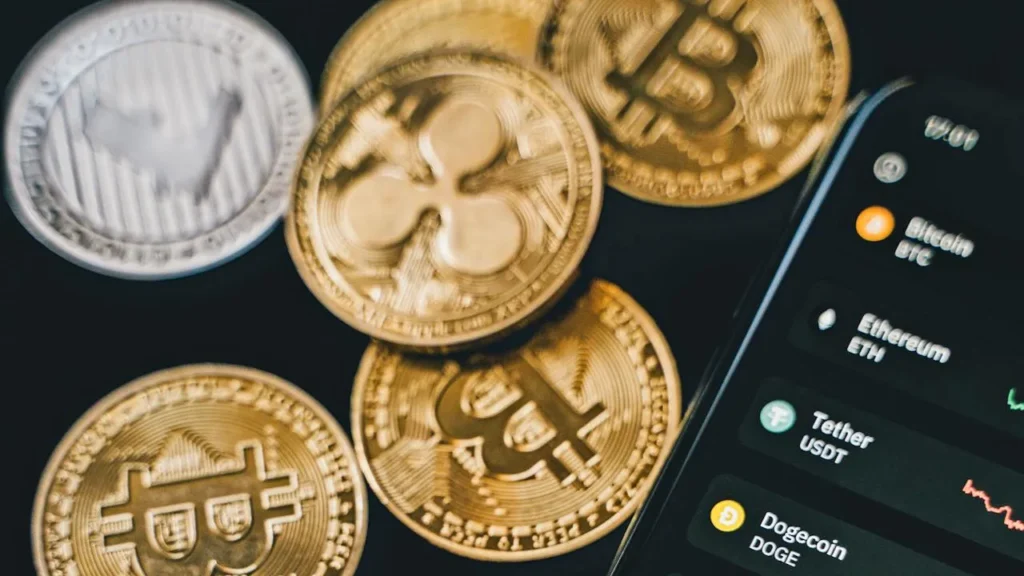Have you decided to join the cryptocurrency market—welcome to the wild, decentralized world where markets never sleep, and you can become a crypto millionaire overnight (or lose everything just as fast). This crypto guide breaks down the essentials to help you start your journey with crypto investing.
What is Cryptocurrency?
Cryptocurrency is digital money. Unlike the dollars or euros sitting in your wallet, crypto lives entirely online, relying on blockchain technology to operate. It’s a super-secure digital ledger that records all transactions made with these currencies. Bitcoin, Ethereum, and thousands of other cryptos use this blockchain technology to run their networks without needing banks or middlemen.
Why is this such a big deal? Because it’s decentralized. No government or central authority controls crypto, which is a huge part of its appeal. That also means you can transfer it globally, almost instantly, with minimal fees.
How to Get Started with Cryptocurrency
Here’s how you can invest in cryptocurrency to start your trading career:
Pick Your Platform
Before you can invest, you need a platform where you can buy, sell, and store your new digital assets. There are plenty of exchanges out there, but some beginner-friendly options include:
- Coinbase: Very easy to use, especially if you’re new to crypto. Moreover, they offer educational resources that pay you in crypto.
- Binance: Offers a huge variety of cryptos and lower fees.
- Cash App: Yes, you can even buy Bitcoin right through Cash App, making it super convenient if you’re already using it.
Each platform has pros and cons—check out their fees, supported cryptocurrencies, and security features before picking your go-to exchange.
Set Up Your Wallet
Think of your crypto wallet as your digital safe, it’s where you store your cryptocurrency. There are different types of wallets, each offering varying levels of convenience and security:
- Hot Wallets (Online Wallets): Great for easy access and trading, but more vulnerable to hacks.
- Cold Wallets (Offline Wallets): Typically USB drives store your private keys offline, making them very secure; and ideal for long-term storage.
Tip: If you’re holding big amount of crypto, you should definitely look into cold storage like hardware wallets to keep your investments safe.
Which Cryptocurrency Should You Invest In?
There are thousands of cryptocurrencies to choose from, and no, they’re not all Bitcoin clones. Some focus on privacy, like Monero, while others aim to disrupt entire industries with smart contracts, like Ethereum.
Here’s a quick cheat sheet to help you decide:
- Bitcoin (BTC): The OG of cryptocurrency, with a history of solid (but volatile) growth.
- Ethereum (ETH): The foundation of decentralized apps and NFTs, and one of the most promising long-term investments.
- Stablecoins (USDT, USDC): Cryptos pegged to a traditional currency like the U.S. dollar. Great for reducing risk without completely exiting the crypto market.
Market cap and trading volume are good indicators of a crypto’s stability and liquidity. Avoid investing in random, “trending” coins just because they’re being hyped online. Stick to well-established cryptocurrencies, especially if you’re a newbie.
How Much Should You Invest?
Cryptocurrency can be a rollercoaster ride of emotional highs and lows. One minute your portfolio looks like you’re on your way to buying a Lamborghini, and the next, it’s crashing harder than my hopes after high school math exams.
Here’s a golden rule: Only invest what you can afford to lose. Crypto is a high-risk, high-reward market. While the potential for massive gains is real, so is the potential to lose big. Start with a small investment, especially if you’re new.
Staying Secure
Crypto might be decentralized, but that doesn’t mean it’s completely immune to risks. Hacks, phishing scams, and shady exchanges can wipe out your funds faster than a market crash.
Some quick security tips include:
- Use Two-Factor Authentication (2FA): This adds an extra layer of security to your accounts.
- Be Cautious of Scams: If something sounds too good to be true, it probably is. Avoid sketchy “get rich quick” crypto schemes.
- Diversify Your Storage: Don’t keep all your crypto eggs in one basket. Consider spreading them across different wallets.
Play the Long Game
The cryptocurrency market is volatile—price swings of 20% in a single day aren’t uncommon. If you’re day trading, be prepared. But if you’re like most of us, adopting a long-term strategy is probably wiser. When you see prices dip, avoid the knee-jerk reaction to sell everything in a panic. Instead, keep your cool, assess the market, and think long-term. Historically, the market has bounced back from even the steepest crashes.
Stay Informed
The crypto world moves fast, and things change almost daily. Stay updated with market trends, read crypto news, and don’t be afraid to learn. Knowledge is your best defense against making rash, emotionally driven decisions.
Legal Factors You Need to Know
Cryptocurrency isn’t regulated the same way in every country. In some places, it’s taxed like regular assets; in others, it’s a bit of a gray area. Make sure you understand the rules in your country, especially when it comes to reporting your gains for tax purposes.
That’s it! You have now learned the basics you need to start your cryptocurrency investment. Remember, don’t go after getting rich quickly—make informed, secure, and patient decisions.
Disclaimer
The information provided in this article is only for educational and informational purposes and should not be considered financial or investment advice. We are not licensed financial advisors. Always conduct your research and seek guidance from a certified financial professional before making any investment decisions.






